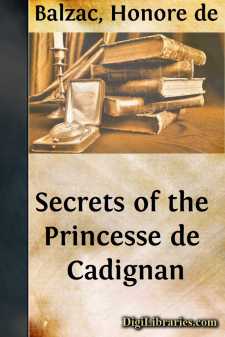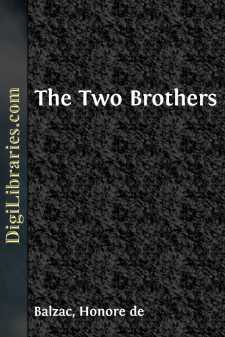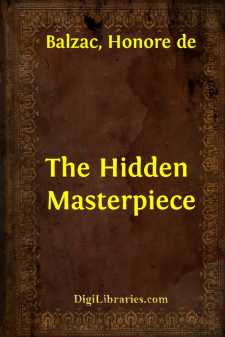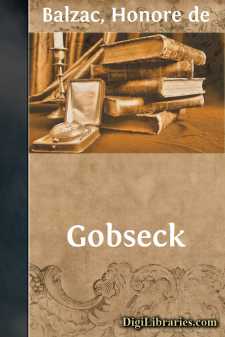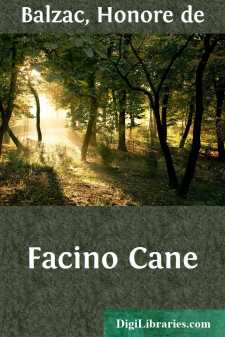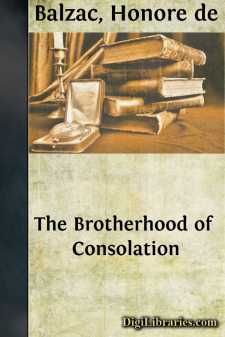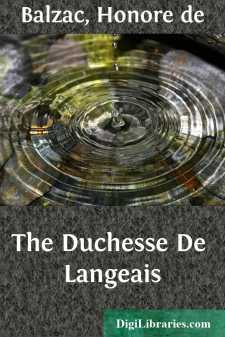Literary Collections
- American 84
- Ancient, Classical & Medieval 14
- Asian 1
- Australian & Oceanian 1
- Canadian 55
- Continental European
- English, Irish, Scottish, Welsh 179
- Essays 160
- General 24
- Letters 46
- Middle Eastern 1
Continental European Books
Sort by:
by:
Honore de Balzac
A MAN OF BUSINESS The word lorette is a euphemism invented to describe the status of a personage, or a personage of a status, of which it is awkward to speak; the French Academie, in its modesty, having omitted to supply a definition out of regard for the age of its forty members. Whenever a new word comes to supply the place of an unwieldy circumlocution, its fortune is assured; the word lorette has...
more...
by:
Honore de Balzac
CHAPTER I. THE LAST WORD OF TWO GREAT COQUETTES After the disasters of the revolution of July, which destroyed so many aristocratic fortunes dependent on the court, Madame la Princesse de Cadignan was clever enough to attribute to political events the total ruin she had caused by her own extravagance. The prince left France with the royal family, and never returned to it, leaving the princess in Paris,...
more...
by:
Honore de Balzac
CHAPTER I In 1792 the townspeople of Issoudun enjoyed the services of a physician named Rouget, whom they held to be a man of consummate malignity. Were we to believe certain bold tongues, he made his wife extremely unhappy, although she was the most beautiful woman of the neighborhood. Perhaps, indeed, she was rather silly. But the prying of friends, the slander of enemies, and the gossip of...
more...
by:
Honore de Balzac
THE ELIXIR OF LIFE One winter evening, in a princely palace at Ferrara, Don Juan Belvidero was giving a banquet to a prince of the house of Este. A banquet in those times was a marvelous spectacle which only royal wealth or the power of a mightly [sic] lord could furnish forth. Seated about a table lit up with perfumed tapers, seven laughter-loving women were interchanging sweet talk. The white marble...
more...
by:
Honore de Balzac
CHAPTER I On a cold morning in December, towards the close of the year 1612, a young man, whose clothing betrayed his poverty, was standing before the door of a house in the Rue des Grands-Augustine, in Paris. After walking to and fro for some time with the hesitation of a lover who fears to approach his mistress, however complying she may be, he ended by crossing the threshold and asking if Maitre...
more...
by:
Honore de Balzac
GOBSECK It was one o'clock in the morning, during the winter of 1829-30, but in the Vicomtesse de Grandlieu's salon two persons stayed on who did not belong to her family circle. A young and good-looking man heard the clock strike, and took his leave. When the courtyard echoed with the sound of a departing carriage, the Vicomtesse looked up, saw that no one was present save her brother and a...
more...
by:
Honore de Balzac
TRANSLATORS PREFACE When, in March, 1832, the first volume of the now famous Contes Drolatiques was published by Gosselin of Paris, Balzac, in a short preface, written in the publisher's name, replied to those attacks which he anticipated certain critics would make upon his hardy experiment. He claimed for his book the protection of all those to whom literature was dear, because it was a work of...
more...
by:
Honore de Balzac
FACINO CANE I once used to live in a little street which probably is not known to you—the Rue de Lesdiguieres. It is a turning out of the Rue Saint-Antoine, beginning just opposite a fountain near the Place de la Bastille, and ending in the Rue de la Cerisaie. Love of knowledge stranded me in a garret; my nights I spent in work, my days in reading at the Bibliotheque d'Orleans, close by. I lived...
more...
by:
Honore de Balzac
I. THE MALADY OF THE AGE On a fine evening in the month of September, 1836, a man about thirty years of age was leaning on the parapet of that quay from which a spectator can look up the Seine from the Jardin des Plantes to Notre-Dame, and down, along the vast perspective of the river, to the Louvre. There is not another point of view to compare with it in the capital of ideas. We feel ourselves on the...
more...
by:
Honore de Balzac
THE DUCHESSE OF LANGEAIS In a Spanish city on an island in the Mediterranean, there stands a convent of the Order of Barefoot Carmelites, where the rule instituted by St. Theresa is still preserved with all the first rigor of the reformation brought about by that illustrious woman. Extraordinary as this may seem, it is none the less true. Almost every religious house in the Peninsula, or in Europe for...
more...



